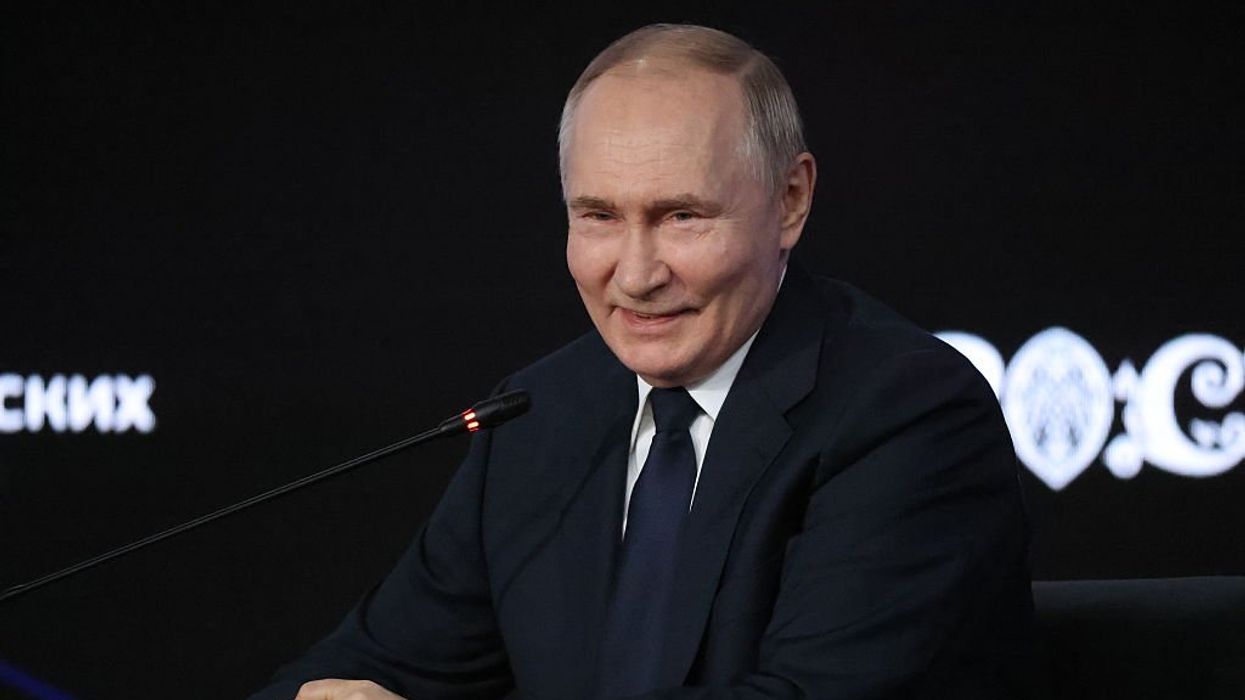President Donald Trump issued a warning to Russia this week. He demanded that Russian leader Vladimir Putin end the Ukraine war in 50 days, or else. But does anyone care?
“Putin played Trump” has resurfaced with renewed intensity as political analysts, former aides, and media commentators dissect the evolving dynamic between the two leaders. What was once a murmur has become a chorus, with even conservative voices acknowledging that Trump may have misjudged the Russian president’s intentions.
A deflated Trump made his favorite threat, economic sanctions—an about-face policy shift after months of failed diplomacy. For years, Trump touted that he alone could end the devastating war, but now he says, “We get a lot of bulls--- thrown at us by Putin. He’s very nice to us all the time, but it turns out to be meaningless," he told reporters at Monday's White House meeting.
Trump also warned of secondary tariffs on Russian trading partners China and India, and more weapons for Kyiv if Moscow didn't comply.
Putin has yet to respond publicly, but Russian leaders did in a similar way to Trump's request to halt missile strikes. “Trump issued a theatrical ultimatum to the Kremlin. The world shuddered, expecting the consequences,” Dmitry Medvedev, deputy chair of the Security Council of the Russian Federation, flippantly wrote in a post on the social platform X.
Investors have largely brushed off the ultimatum, according to reports from The Hill. The Moscow Stock Exchange grew by 2.7 percent as of Tuesday morning, signaling a lack of concern that Trump will follow through on his threat.
Trump Tries To Rewrite History
Trump is also backpedaling on his bromance with Putin, saying, “He’s fooled a lot of people. He fooled Bush. He fooled a lot of people. He fooled Clinton, Bush, Obama, Biden. He didn’t fool me,” Trump said.
However, just five months ago, Trump said he did trust Putin on the most central of issues – whether he wanted peace in Ukraine, reports CNN. “I believe he wants peace,” Trump said February 14, adding: “I mean, I know him very well. Yeah, I think he wants peace. I think he would tell me if he didn’t. … I trust him on this subject.”
Three years ago, Trump described Putin’s invasion of Ukraine as “genius” and “savvy,” praising a move that spurred universal condemnation from the U.S. government and its trans-Atlantic allies. “I went in yesterday, and there was a television screen, and I said, ‘This is genius.’ Putin declares a big portion of the Ukraine — of Ukraine — Putin declares it as independent. Oh, that’s wonderful,” Trump said in a radio interview with “The Clay Travis and Buck Sexton Show.”
Lukewarm Reaction to Trump’s Threat
CNN reports that officials, including European Union Foreign Affairs Chief Kaja Kallas, praised the tougher stance but cast the timeframe as a very long one.
Former British Prime Minister Boris Johnson, who has often allied with Trump, praised him for “turning up the heat on Putin.”
“But why wait? Putin is butchering innocent people every day. Let’s get this thing over,” Johnson posted on X.
Fox News’ chief political analyst Brit Hume recently stated that Trump “got played by Putin,” citing the president’s initial reluctance to escalate the conflict in Ukraine and his belief that Putin was ready to negotiate peace. Hume noted that Trump was “jollied along” under the impression that Putin wanted to end the war, only to realize that the Russian leader had broader ambitions.
Fiona Hill, a former National Security Council official, offered a behind-the-scenes look at Trump’s interactions with Putin. She claimed that Putin often mocked Trump during their calls, using subtle language and tone that was lost in translation. Hill described the exchanges as “amateur hour,” suggesting that Trump was more focused on personal rapport than strategic diplomacy.
"Trump put Putin above U.S. national interests, and Putin hasn’t returned the favor," argues Nicholas Grossman, political science professor at the University of Illinois. "Instead of prioritizing Trump’s image-crafting, Putin keeps prioritizing Russia’s national power. Putin wouldn’t even need to do much — he could just say this was all Joe Biden’s fault and give Trump something flimsy he can call a deal — but Putin won’t do even that. If anything, Putin seems to enjoy these displays of dominance, toying with Trump rather than giving him a fig leaf," he writes in an opinion editorial.
Whether Trump is a victim of geopolitical gamesmanship or a willing participant in a flawed strategy, the consensus is shifting. The narrative that Putin outmaneuvered Trump is no longer confined to partisan corners—it’s being echoed across the political spectrum.
Hugo Balta is the executive editor of the Fulcrum and the publisher of the Latino News Network.




















Trump & Hegseth gave Mark Kelly a huge 2028 gift